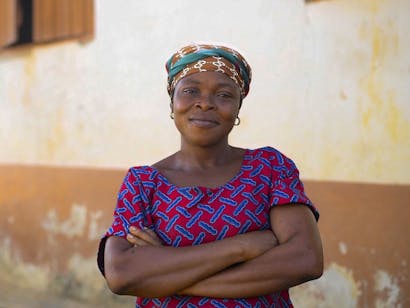The importance of telecommunications for women entrepreneurs
On World Telecommunication Day (17th May 2019) we are raising awareness about the importance of telecommunications for women entrepreneurs. Telecoms has a strong connection with CARE’s current Access Approved campaign which calls on the financial sector to develop products and services that are specifically designed to meet the needs of women. But it’s not just financial independence that a mobile phone can bring, it’s also improved health and education, access to government services and local information, employment opportunities and much more.

Women will continue to be excluded
Increasing women’s ownership and access to a mobile phone are an important means concerning financial inclusion. It enables immediate access to funds and reduces the time and travel costs of paying bills. Although banks and telecoms companies are heavily investing in mobile banking, the fact that women still have less access to mobile phones than men means that women will continue to be excluded from using digital financial products and services.
Missed opportunities
390 million women in lower-middle-income countries still do not own a mobile phone, while over 1.2 billion women do not use mobile internet – a major barrier to pursuing and benefiting from economic opportunities. This equates to 26 per cent of women not owning a mobile phone in developing countries, compared to 16 per cent of men. This is not only a missed opportunity for women, but it also represents a $15 billion missed opportunity for the mobile phone industry.

Big benefits
A Findex study found that access to mobile money services in Kenya delivered big benefits, especially for women. It enabled women-headed households to increase their savings by more than a fifth; allowed 185,000 women to leave farming and develop a business or retail activities; and helped reduce extreme poverty among women-headed households by 22%.
A low level of awareness and understanding of how to use mobile banking can also be a barrier and CARE is working with women across the world to improve digital literacy and access. For example, as part of the Women in Enterprise programme, supported by H&M Foundation, CARE is offering financial literacy training to women in Peru by using tablets and specific apps.
Advantages of owning a mobile phone
There are multiple advantages to owning a mobile phone. For example having better access to pricing information in local markets, which can improve an entrepreneur’s negotiation power in both running their own business, and as a customer. Mobile phone ownership also opens access to other information such as government announcements (including democratic participation), security alerts, health services & advice (including registering births), new trends in their sector, training opportunities and much more.
It also enables women entrepreneurs to pay and receive wages, government benefits and pensions. Women running agricultural businesses who own a mobile phone also have better access to weather forecasts and agricultural extension services, which is vital for farmers to improve their production.
Continue to invest
On this International Telecommunication Day, we hope that we can raise awareness of the ongoing issues that women face and encourage the banks and mobile phone operators to continue to invest in women’s access to mobile phones so that their own enterprises can reap the benefits.
Photo credit: Eva van Barneveld
As part of the #AccessApproved campaign 2019, CARE compiled the desk research ‘Access to Finance for female entrepreneurs in low-income communities’.


